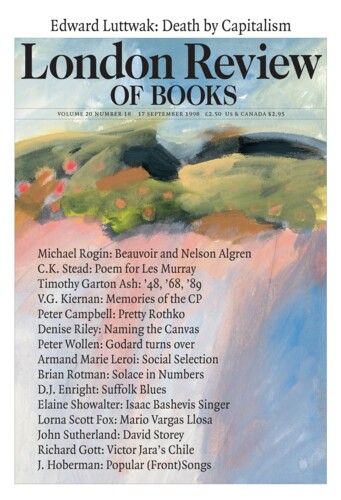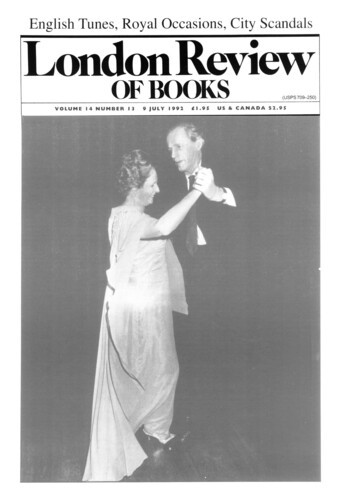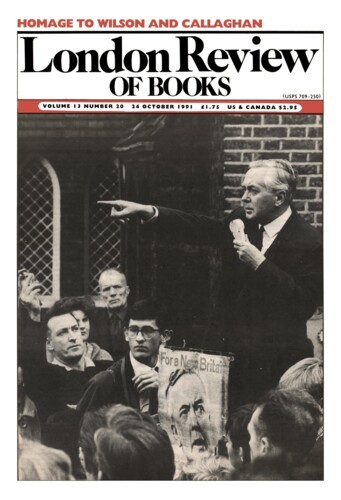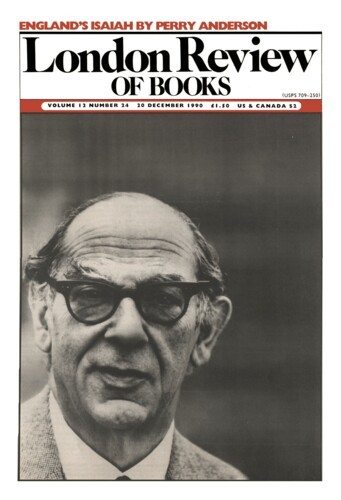V.G. Kiernan
V.G. Kiernan, who died in 2009, taught history at Edinburgh University for many years. He wrote about treason and Tory conceptions of loyalty in the LRB in 1987, noting that, in 1930s Cambridge, ‘it was about the defenders of the old order that a strong smell of treason hung.’ Of Guy Burgess, who helped induct him into the party there, he said: ‘He did what he felt it right for him to do; I honour his memory.’ After the war Kiernan was a member of the Communist Party Historians’ Group. His books include The Lords of Human Kind: European Attitudes to Other Cultures in the Imperial Age, The Duel in European History and Tobacco: A History.
The Unrewarded End: Memories of the CP
V.G. Kiernan, 17 September 1998
Studies of the Communist Party of Great Britain and its troubled history proliferate. An attraction for some must be that it is now safely dead and buried: there is no live bear to break out of its cage and retaliate.
Grains and Pinches
V.G. Kiernan, 9 July 1992
A ‘covenant of salt’ meant to the Hebrews an inviolable pledge, most likely because salt has served through ages as a preservative. Early Christians were taught to think of themselves as ‘the salt of the earth’. No other chemical has found its way into the common sayings of so many lands as sodium chloride has done. It has been an emblem of human relations and loyalties. A man should be ‘true to his salt’, or faithful to the superior who has provided him with a living. In Russia bread and salt, khleb-solya, has meant welcome or hospitality. Sowing of a defeated enemy’s fields with salt, to render them sterile, as at Carthage by the Romans, was a symbolic proclamation (it cannot have been more) of triumph.
Diary: Leningrad Renamed
V.G. Kiernan, 24 October 1991
Four years ago in November, when the 70th anniversary of the Revolution was being celebrated, I was in the procession moving slowly along the Nevsky Prospekt in Leningrad. Placards everywhere hailed perestroika; the atmosphere, as well as I could make out, was of good-humoured hopefulness, rather than vibrant enthusiasm. In the evening a multitude gathered to watch the fireworks over the river, close to the Winter Palace. A few juvenile rowdies were in evidence, no police. It is melancholy now to learn of that city, with its heroic record, renouncing its name, and going back not even to its last, Russian name of Petrograd, but to the original German one; and of the return of the flag of the Tsars, which was flying over the Winter Palace when the workers were massacred outside it in January 1905.
Highland Hearts
V.G. Kiernan, 20 December 1990
‘Just inside the fir-dusk a hollow oblong of stones now showed, brown and damp with that stupefied or browbeaten look of an abandoned croft-house … Here was Unnimore.’ Here, too, was David Craig, groping through a wilderness in Morvern in search of a long-abandoned hamlet; his treasure-trove the remains of eight little houses, their stones covered with ‘whiskery grey lichens’. A hundred pages on, our intrepid explorer is being driven across the shingle of Hudson Bay by ‘a sturdy black-eyed woman of Highland Cree descent’, in a three-wheeler with a rifle aboard in case of polar bears, on the track of a lost settlement of folk cleared from Kildonan. His reward this time is a crumbling gravestone, with a name and a date – 1813 – still legible, probably the furthest-north relic left by any exiled Highlander.’
Pieces about V.G. Kiernan in the LRB
Booze and Fags
Christopher Hitchens, 12 March 1992
When the effects of drink are not extremely funny, they do have a tendency to be a bit grim. For every cheerful fallabout drunk there is a lugubrious toper or melancholy soak, draining the flask for no...
Knowing more
Rosalind Mitchison, 14 September 1989
Victor Kiernan is here presenting essays produced over the last 45 years: the texts are only occasionally given recent additions. The topics include three essays on literature but are otherwise...
The point of it all
Linda Colley, 1 September 1988
In 1759 the future Viscount Townshend challenged the Earl of Leicester to a duel. But Leicester refused to fight. He was, he claimed, too old and too ill; he could not hit a barn door with a...
Glory
Eric Hobsbawm, 3 June 1982
Is it a good thing that a country, after almost forty years of accelerating decline, has nothing more satisfactory to look back upon than a victorious world war with relatively modest casualties?...
Centralisation
Peter Burke, 5 March 1981
Every student and every teacher knows the importance of the ‘seminal article’, which packs into a few pages more ideas than many books. In the field of European history, one such...
Read anywhere with the London Review of Books app, available now from the App Store for Apple devices, Google Play for Android devices and Amazon for your Kindle Fire.
Sign up to our newsletter
For highlights from the latest issue, our archive and the blog, as well as news, events and exclusive promotions.




